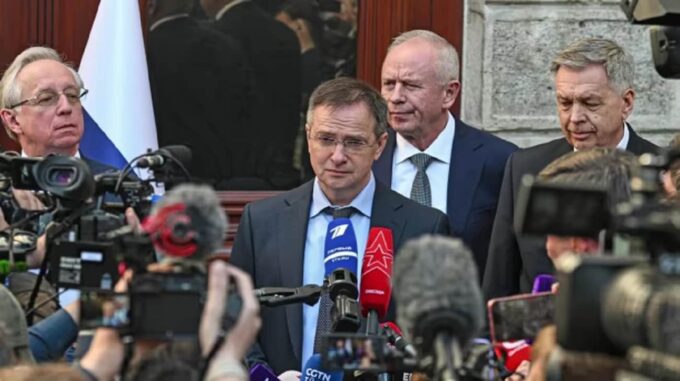The Institute for the Study of War (ISW) analyzes the situation surrounding Russia’s attitude toward the negotiation process regarding Ukraine and makes firm conclusions about Moscow’s level of interest in seeking a peaceful resolution

According to the latest data, Russia’s decision to send low-level representatives to a new round of talks in Istanbul indicates a lack of genuine desire for constructive dialogue, instead confirming its intention to delay the process and maintain its current stance, which allows it to sustain military activity and pressure on Ukraine. Analysts are convinced that this tactic suggests the Kremlin has no serious intentions to negotiate on real terms, and that the entire process may be used as a tool to prolong the conflict. They emphasize that Russia’s decision to delegate low-level specialists once again for negotiations in Istanbul is a dangerous signal for Ukraine and the international community: this action could indicate Moscow’s desire to mimic a diplomatic process without any real commitment to peace. The ISW report includes precise quotations from statements made by Russian representatives, which together deepen concern about this situation. In particular, Russian UN representative Vasily Nebenzya openly emphasized during the Security Council meeting on May 30 that Moscow is prepared to fight Ukraine as long as necessary — “even until complete victory.” When asked whether Ukraine could accept Russia’s terms for peace, he replied negatively, hinting that Moscow intends to continue fighting until final victory and rejecting the possibility of compromises. At the same time, Nebenzya stated that the US has “opened its eyes” to the “root causes” of the conflict in Ukraine and accused the West of supporting Kyiv, which, according to him, “threatens to escalate the war.” His statement also includes calls for the West to stop supplying weapons to Kyiv and to cut military aid, which Moscow claims should be a prerequisite for ending hostilities. Russian diplomacy openly indicates that it sees the negotiation process more as a political tool to buy time rather than a genuine attempt to reach an agreement. On May 29, the Russian Foreign Ministry announced that the Russian delegation in Istanbul on June 2 will be the same — low level, as in previous instances — and, according to spokesperson Maria Zakharova, Moscow has no intention to change tactics and will reiterate its old demands. This aligns with the concept of prolonging the conflict to gain additional positional advantages from the West and Ukraine. The ISW report emphasizes that such decisions by Russian officials only confirm that Moscow is not interested in sincere negotiations, and their main goal is to drag out the war, maintain military actions, and exert further pressure on Kyiv and Western countries. Russia continues to view negotiations not as a path to peace but as an instrument of abuse that helps preserve and strengthen the Kremlin’s positions in the context of a future military campaign in Ukraine. Therefore, the international community must remain vigilant and prepared for new provocations and simulated peace processes while Moscow retains its reluctance to make real concessions.

